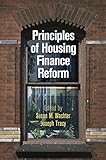Principles of Housing Finance Reform / ed. by Susan M. Wachter, Joseph Tracy.
Material type: TextSeries: The City in the Twenty-First CenturyPublisher: Philadelphia : University of Pennsylvania Press, [2016]Copyright date: ©2016Description: 1 online resource (288 p.) : 23 illusContent type:
TextSeries: The City in the Twenty-First CenturyPublisher: Philadelphia : University of Pennsylvania Press, [2016]Copyright date: ©2016Description: 1 online resource (288 p.) : 23 illusContent type: - 9780812248623
- 9780812293739
- 332.7/220973 23
- online - DeGruyter
- Issued also in print.
| Item type | Current library | Call number | URL | Status | Notes | Barcode | |
|---|---|---|---|---|---|---|---|
 eBook
eBook
|
Biblioteca "Angelicum" Pont. Univ. S.Tommaso d'Aquino Nuvola online | online - DeGruyter (Browse shelf(Opens below)) | Online access | Not for loan (Accesso limitato) | Accesso per gli utenti autorizzati / Access for authorized users | (dgr)9780812293739 |
Frontmatter -- CONTENTS -- Introduction -- PART I. STRUCTURAL REFORM OPTIONS -- Chapter 1. Legislative Approaches to Housing Finance Reform -- Chapter 2. The Capital and Governance of a Mortgage Securitization Utility -- Chapter 3. Macroprudential Mortgage- Backed Securitization: Can It Work? -- PART II. HOUSING FINANCE: BEYOND THE BASICS -- Chapter 4. Reforms for a System Th at Works: Multifamily Housing Finance -- Chapter 5. The Once and Future Federal Housing Administration -- Chapter 6. The Federal Home Loan Bank System and U.S. Housing Finance -- PART III. HOUSING FINANCE INFRASTRUCTURE -- Chapter 7. The TBA Market: Effects and Prerequisites -- Chapter 8. The Significance and Design of a National Mortgage Note Registry -- Chapter 9. Informed Securitization -- Notes -- References -- List of Contributors -- Index
restricted access online access with authorization star
http://purl.org/coar/access_right/c_16ec
In the fall of 2008, the world watched in horror as the U.S. housing finance system shattered, triggering a global financial panic and ultimately the Great Recession. Now, nearly a decade later, the long and slow housing recovery has reached a critical moment. Though the housing finance system has stabilized, it remains in the hands of the federal government, leaving taxpayers exposed to the credit risk while private funding remains mostly on the sidelines.Principles of Housing Finance Reform identifies the changes necessary to modernize the housing finance system, identifying guiding principles that should underlie a rebuilt system. Contributors to the volume set out a wealth of innovative solutions that are possible within this framework, presenting proposals for long-term structural reforms that would infuse new life into the U.S. housing finance system while enhancing long-term stability.Nearly a decade after the inception of the Great Recession, reform proposals have arisen across the political spectrum. This is a moment of opportunity for rebuilding a key sector of the U.S. economy. The research in this volume represents the best thinking of policy researchers and economic experts on the challenges that lie ahead and provides a roadmap for reforms to create a system characterized by liquidity, stability, access, and sustainability.Contributors: W. Scott Frame, Meghan Grant, John Griffith, Diana Hancock, Stephanie Heller, Akash Kanojia, Patricia C. Mosser, Kevin A. Park, Wayne Passmore, Roberto G. Quercia, David Scharfstein, Phillip Swagel, Joseph Tracy, Susan M. Wachter, Dale A. Whitman, Mark A. Willis, Joshua Wright.
Issued also in print.
Mode of access: Internet via World Wide Web.
In English.
Description based on online resource; title from PDF title page (publisher's Web site, viewed 30. Aug 2021)


